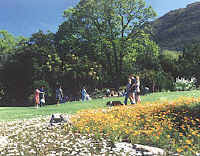I had a lot of misconceptions about Cape Town. I imagined
a dusty, dry place, dotted with big game reserves and ghettoes
housing poor “Blacks”. I thought the “Whites” would be the
most boorish, racist, unsophisticated lugs imaginable, and
that nightlife would be reduced to chugging a few brews
and munching some Boerwurst sausage.
I could not have been more wrong.


There was nothing dry about the landscape that unfolded itself
to me from the airport. The monolithic Table Mountain is
the centerpiece of this lush, green city. Flat and usually
covered with wispy strands of cloud, the mountain offers
both an immediate escape from the bustle of downtown, and
a springboard for adventurous hikers, climbers, parachutists,
and hang-gliders.
Beaches are another getaway option. Spectacularly surrounded
by the mountain and pure air, each small oasis has its own
“culture”, be it the familiar vibe of Camp’s Bay or the
moneyed atmosphere of Clifton. However, the icy Atlantic
is none too inviting, even in summer. Unless you are a penguin.
I expected to see lions and elephants on this jaunt to
Africa, and while these can be found further north, penguins,
seals, whales and all kinds of deerish creatures abound
in the Cape. Who knew?
And why shouldn’t these creatures live in a city? Cape
Town is incredibly pristine and well-planned: there are
no towering apartments to block Mother Nature’s spectacular
views; the centre of town is free from traffic congestion,
and there are so many “green” areas, it is easy to forget
that one is in a city.
In fact, it is easy to forget that one is in Africa. The
nightclubs are just as cool as anything is in our fair city;
fashion is obviously influenced by London, and cultural/geographical
comparisons to Australia and LA are common. The plethora
of excellent, stylish restaurants reflects the wealth of
cultures that gave South Africa its nickname: “the Rainbow
Nation”.
But a rainbow it remains, with all the colours separately
forming a whole. Surely, living in Canada and growing up
without seeing someone’s skin colour as an issue have spoiled
me. I was saddened to notice that the racial groups only
hung out in their own circles, and I was disturbed even
further when, after some time spent there, I began to be
a little wary of Black men, especially at night. Crime is
a problem, and although one may understand the underlying
reasons for it, it doesn’t mean caution can be thrown to
the wind.
Despite these ongoing social problems, the Whites were
not the racist thugs I expected them to be. There were several
reasons given for this:
1) Cape Town has always been to South Africa what New York
is the USA: a hipper, more liberal oasis in a racist nation;
2) All the really nasty white people fled to Canada, Australia
or the USA when Mandela took power; and finally
3) Things change.
In fact, most of the natives I met in Cape Town were so
curious about their international image, that if I had a
Rand for every time one of them asked me: “What do people
think of us in Canada?” I could have payed to stay for another
week.
There is so much productive, critical dialogue and debate
on the social problems facing South Africa today that one
feels that if things haven’t been resolved yet, they soon
will.
When To Go
January and February are the most popular and the warmest
months; the climate is similar to that of, say, the Southern
States, but the seasons are reversed.
What To Do
There are tons of Electronica, Jazz, and Frat-house type
bars, but there are few Lounge-type places.
Recommended are the Funktion, Rush and Orange for dance
music; Mama Africa for African food and tunes; Blues or
the Green Dolphin for jazz, and the Drum Caf� for a more
granola vibe. Most bars and clubs are concentrated along
Long Street and Orange or near Sea Point.
Sea Point has a huge flea market every Sunday, selling
everything from African crafts to bedclothes, and even the
most chi-chi shopping centre at the Victoria and Albert
Mall has first-class goods at third-world prices.

 Weekend trips can be taken to the lush Vineyards of Paarl, or through the scenic Garden Route along the ocean. Kirstenbosh Gardens is a must-see park full of hectares of exotic flowers and
Weekend trips can be taken to the lush Vineyards of Paarl, or through the scenic Garden Route along the ocean. Kirstenbosh Gardens is a must-see park full of hectares of exotic flowers and
plants, and the Cape of Good Hope Reserve is the place for
animal lovers to go on a photo-safari.
Questions?
If you want more information about this area you can email the author or check out our Africa Insiders page.
Money
The currency of South Africa is called the Rand, and right now,
it’s in a slump. Expect to pay about fifty cents for a cup of
coffee, three bucks for lunch and five for dinner.
Where to Stay
Hostels are everywhere, and almost all of them are sublime. I recommend Ashanti Lodge, where I paid three bucks a night for a clean, safe
shared room, with swimming pool, kitchen and caf�.
If you prefer the privacy of a hotel, the Holiday Inn has rooms starting at around sixty dollars, and the Mount Nelson Hotel offers five-star accommodation.
Getting Around
Renting a car is recommended, as public transport is confusing.
Hertz has rentals for about $45 a day or $300 a week.
For more information on all of the above, try…
www.CapeTown.co.za
Cape Town Online
Kapstadt
Just Backpacking – Southern Africa